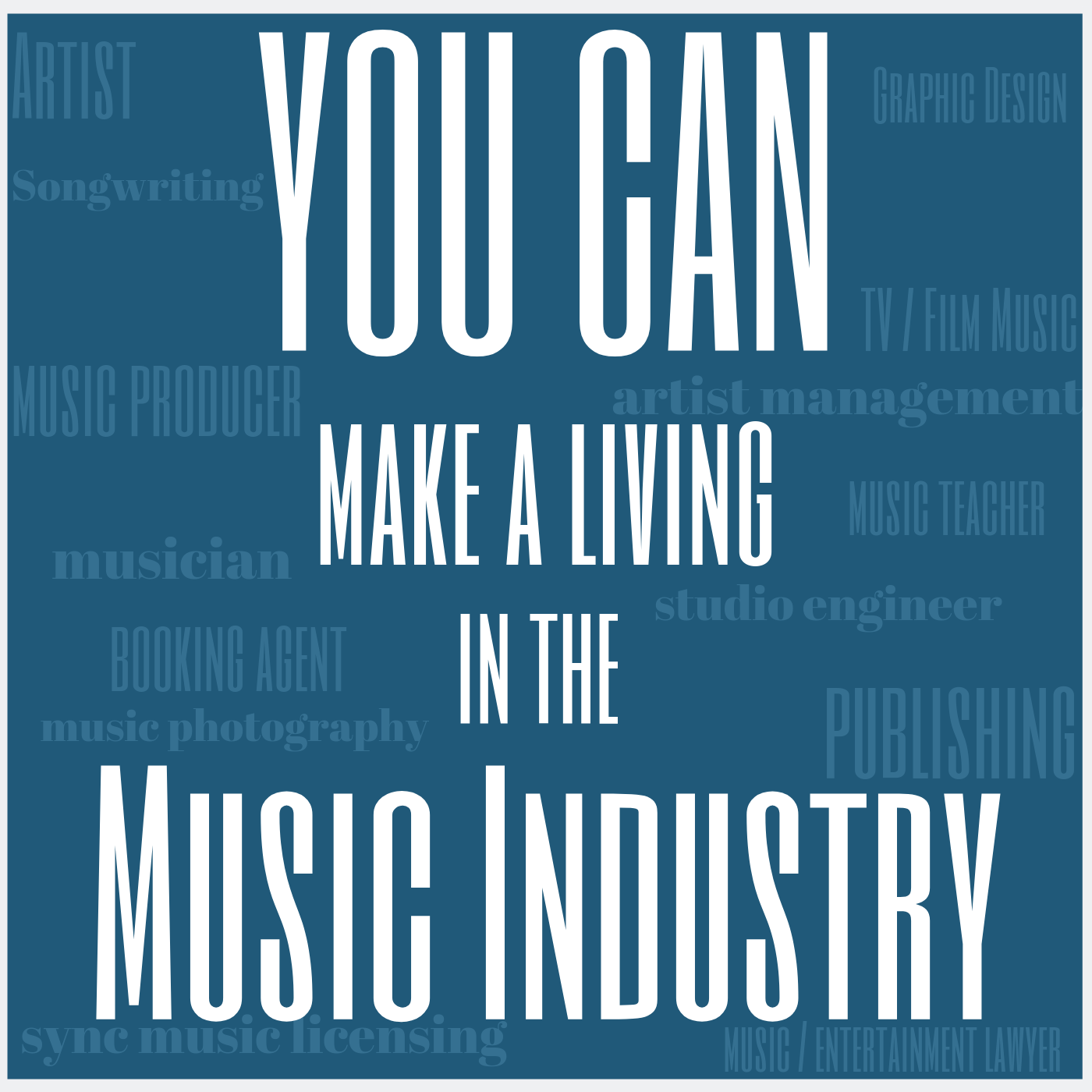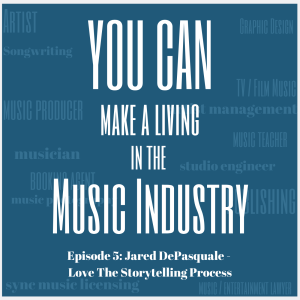

22.7K
Downloads
78
Episodes
Did you know that YOU CAN make a living in the music industry? Celebrities, working class musicians and people just like you who work behind the scenes in all areas of the music business will share their stories, encourage you and give you tools and how-to examples of the ways YOU CAN make a living doing what you love in the music industry.
Episodes

Monday Dec 02, 2019
Episode 5: Jared DePasquale - Love The Storytelling Process
Monday Dec 02, 2019
Monday Dec 02, 2019

I recently met up with my friend Jared DePasquale who is a phenomenal at scoring, arranging and orchestrating music for audio dramas and tv productions. He has won multiple awards for his work and was kind enough to talk with me about his musical journey and give insight for you to put into practice if you want to create music for media.
Show Notes:
Sponsors: Edenbrooke Productions - We offer consulting services and are offering listeners a 1-hour introductory special. To request more info on consulting services, email Marty at contact@johnmartinkeith.com.
Talking Points:
*John Williams who scored Star Wars and Indiana Jones made me fall in love with music.
*Determination beats talent any day of the week.
*I wanted to tell a story through music.
*Tenacity and ability to take risks allowed me to transition from college into the real world more than talent did.
*I applied for grants for USC Film School but missed the deadline. The person I talked with said he had a friend doing what I wanted to do and connected me with composer Joseph LoDuca. He hired me to do some work to reprogram a synthesizer. I worked hard and he kept giving me more responsibility until it turned into a full time assistant job.
*Most of the time relationships are going to be what get you the work.
*I worked on the tv show Hercules: The legendary Journeys assisting Joe.
*A one hour tv show will include about 30 minutes of score and you have a week at most to get it done and move on to the next episode for 22 episodes.
*I was a jack of all trades for him on that show. I did temp tracks, programming, played on some sessions, I helped do some orchestration, etc.
*When you are an assistant or apprentice to an orchestrator, you have to learn how to think like that person and what their tendencies are.
*I also worked on a lot of commercials. The boss sets the tone and is guiding you the whole way and you execute it and he will give you changes to make until it’s where he wants it.
*For commercials you usually only get a few hours to create something and turn it in.
*You have to learn to go with your instinct and choose a direction and go with it.
*The biggest drawback of working for another composer is that it’s hard to find your own voice.
*Finding your own voice is a life long journey.
*I now score audio dramas.
* I hired an agent to pitch my demo reel and it took about 2 years to get work after I left working for Joe.
*My first composer job on my own was scoring an indie horror film and I had 3 weeks to complete it.
*They liked my work and I kept getting hired to do those kinds of films.
*My agent pitched me to do work on audio dramas for Focus On The Family.
*I got hired to work on a project and I was able to conduct an orchestra and have since worked on lots of audio dramas for Focus On The Family and other companies.
*A 3 hour score for Robin Hood took 6 months to write.
*What is the difference between an audio drama and a book on tape?
*An audio drama is a fully emersive story like a movie without the visual. It’s professional actors, sound design, music and production crew.
*You can stream them through sites like Audible.
*Books on tape essentially use canned music that hit transition points from chapter to chapter.
*Audio dramas that are 30 minutes will have 15 minutes of custom score.
*The old style of scoring is called “The Light Motif” which is: Characters have themes. It’s thematic driven.
*Modern scores are very “anti-theme.” Very Static, atmospheric and vibey.
*People love a melody.
*Audio dramas are looking for big time melodies because characters have melodies.
*Not having a visual has made me better as a composer because it has made me think of what the character is thinking about and his motivation. Or what it means when there is a mountain in front of you and you have to make it feel huge because even though you can’t see it, you can feel it.
*There’s no such thing as a bad day making music.
*I don’t give the word “inspiration” a lot of validity.
*If you’re going to write music for a client with a deadline, you have to learn how to write music.
*It’s a balance of discipline and understanding your craft and techniques and doing all the hard work that will internalize and come out.
*I wrote 50 themes for Robin Hood before it got approved.
*If you don’t feel inspired or don’t feel like writing music, go write music.
*Keep at it and you will find what you are trying create.
*It’s not glamorous and it’s hard work, but it is fun.
*You’ll never get there if you don’t do the hard work.
*Advice for getting into scoring :
*If you’re going to create music for any kind of media, love the story telling process more than you love music.
*They are hiring you to understand the story, go deep and emote.
*You have to love working with people.
*Music for media is a collaborative process.
*Starting out as a new composer you might have to work for free on low level entry projects with student film makers.
*Connect with your peers that are trying to do their first projects and get experience. That can lead to more work down the road.
*Build relationships.
*It’s a slow build.
*There is always something to learn.
*What’s the difference between composing and ghost writing?
*Shows require a lot of music in a short period of time. The composer will have a team helping create music but typically only the composer is getting credit for the work, so the other people are called ghost writers.
*They do not get credit for making the music and they don’t get paid the same as the composer. You’re basically an independent contractor that is getting paid to do work for hire. You’re signing away all your rights to the music so you get paid one time to create it but no back end royalties.
*Jared’s website is www.jareddepasquale.com
*Jared’s You Tube Channel
Jared is a storyteller. Music is his language.
For over twenty five years Jared has composed the musical scores for some of Western culture’s most celebrated stories and iconic characters.
The recipient of numerous awards and critical acclaim, his work is widely recognized for its ability to musically capture complex characters amidst stories that are rich in texture and meaning.
Jared has contributed music to over a thousand different projects including scores to The Legends of Robin Hood (Gwilym Lee of Bohemian Rhapsody), The Secret Garden (Dame Joan Plowright of Driving Miss Daisy), Little Women (Gemma Jones from the Harry Potter series), Les Miserables (Brian Blessed of Star Wars Episode 1), The Trials of Saint Patrick (John Rhys-Davies of Lord of the Rings), Ode to Saint Cecilia (Hayley Atwell of The Avengers series), and Brother Francis (Owen Teale of Game of Thrones).
Early in his career, Jared apprenticed under Emmy and ASCAP Award winning composer Joseph LoDuca. With LoDuca, Jared learned the business of composing for A-list projects including the globally syndicated television shows Xena: The Warrior Princess and Hercules: The Legendary Journeys. Immediately following his apprenticeship, Jared was recognized by Music from the Movies as one of the three most promising and interesting talents among film composers today. He has won or been nominated for multiple awards over the years for his contribution to audio dramas.
2018: The Adventum, Volume 1, Wise King Media: WON for “Best Score for an Audio Drama” Audio Theatre Central Seneca Awards
2018: David & Absalom: Adventures in Odyssey, Focus on the Family: Nominated for “Best Score for an Audio Drama” Audio Theatre Central Seneca Awards
2018: Operation Mosul: The Brinkman Adventures, Season 7, Beachglass Ministries: Nominated for “Best Score for an Audio Drama” Audio Theatre Central Seneca Awards
2017: The Trials of Saint Patrick, AIR Theater: WON for “Best Score for an Audio Drama” Audio Theatre Central Seneca Awards
2017: Brother Francis, The Barefoot Saint of Assisi, AIR Theater: WON for “Audio Drama of the Year” by the Audio Publisher’s Association (Audie Awards)
2017: The Trials of Saint Patrick, AIR Theater: Nominated for “Audio Drama of the Year / Historical Non-Fiction” Category by the Audio Publisher’s Association (Audie Awards)
2017: Les Miserables, Focus on the Family: Placed in the Top 5 for “Best Score, New Archival (Digital) Release” by REEL MUSIC
2016: Brother Francis, The Barefoot Saint of Assisi, AIR Theater: WON, “Best Score for an Audio Drama” by Audio Theatre Central
2015: The Hiding Place, Focus on the Family: WON, “Best Score – Other Media” by REEL MUSIC.
2006: At the Back of the North Wind, Focus on the Family: WON, “Achievement in Production” by the Audio Publisher’s Association (Audie Awards). This award encompasses music score, sound design, and sound mixing
2006: The Hiding Place, Focus on the Family: Nominated for “Audio Drama of the Year” by the Audio Publisher’s Association (Audie Awards)
2006: The Hiding Place, Focus on the Family: Nominated for “Achievement in Production” by the Audio Publisher’s Association (Audie Awards)
2005: Little Women, Focus on the Family: Nominated for “Achievement in Production” by the Audio Publisher’s Association (Audie Awards)
No comments yet. Be the first to say something!